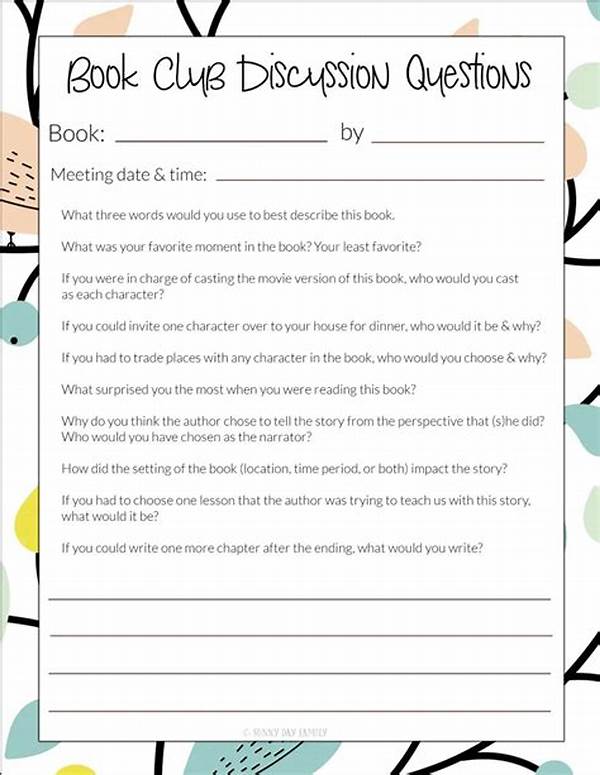Delving into the world of books often opens the gates to endless imagination and thought-provoking ideas. Whether reading a classic novel or exploring contemporary literature, discussing books can enrich our understanding of the world and ourselves. Creating reflective book discussion questions is an invaluable skill that enhances these discussions, enabling readers to uncover deeper meanings and allowing for a connection with the text on a more personal level.
The Art of Creating Reflective Book Discussion Questions
Crafting insightful and engaging questions requires an understanding of the book’s themes, characters, and plot intricacies. Start by identifying the main themes and how they relate to the characters’ development throughout the story. Reflective questions can include inquiries about the motivations behind a character’s decisions or the implications of a particular setting. Creating reflective book discussion questions can prompt readers to consider different perspectives, fostering an environment of shared insights and enriching dialogues.
When developing questions, it’s important to encourage participants to relate the book’s events or characters to personal experiences. These connections make discussions more meaningful. Creating reflective book discussion questions also involves questioning the author’s intentions – why did they choose a specific narrative style, or what message were they hoping to convey? Encouraging readers to support their opinions with evidence from the text promotes a thoughtful exchange of ideas.
Techniques for Creating Reflective Book Discussion Questions
1. Focus on Character Analysis:
Unpack the layers of each character to understand their motivations. Creating reflective book discussion questions could involve asking how a character’s past influences their current actions.
2. Explore Thematic Elements:
Probing questions about underlying themes invite deeper thinking. Consider what the author wants to express about a theme through the plot and characters.
3. Investigate Symbolism:
Dive into symbolic elements present within the book and create questions around their relevance and impact.
4. Analyze the Setting:
Understanding the significance of the setting can shape comprehension of the narrative’s context. Ask how the setting influences the mood and characters.
5. Consider Alternative Endings:
Speculate on different endings for the book and discuss how these potential changes could alter the overarching message.
Benefits of Creating Reflective Book Discussion Questions
Creating reflective book discussion questions isn’t just about analyzing text; it’s also about enhancing the reading experience. When readers tackle complex questions, they engage with the material actively. This increased engagement can lead to a more vivid and nuanced understanding of the text. By asking questions that challenge assumptions or explore deeper meanings, readers are invited to journey beyond the surface level, contemplating broader implications on a personal and social level.
Reflective questions also encourage participants to listen and appreciate diverse interpretations. When different viewpoints converge, it cultivates empathy and intellectual openness. Creating reflective book discussion questions helps establish a respectful environment where multiple opinions coexist, fostering a collective appreciation for literature. Such discussions can resonate long after they conclude, often inspiring further reading and exploration of related themes and genres.
Essential Aspects of Creating Reflective Book Discussion Questions
Creating reflective book discussion questions comes with understanding the nuances of language and literature. Here’s how to achieve this:
1. Encourage Personal Reflection:
Draw on personal experiences; questions that resonate personally often lead to more engaging conversations.
2. Promote Comparative Thinking:
Encourage readers to compare and contrast elements within the book or with other readings.
3. Emphasize Critical Analysis:
Focus not just on what happens in the book but why it happens and its broader implications.
4. Appreciate Literary Devices:
Create questions about the author’s use of metaphors, irony, or foreshadowing.
5. Facilitate Emotional Engagement:
Sensible to emotions invoked by the story can lead to a more profound discussion.
6. Dig into Textual Evidence:
Pose questions that require finding examples in the text to support interpretations.
7. Understand Contextual Background:
Consider questions that delve into the historical or cultural background of the book.
8. Explore Moral and Ethical Dilemmas:
Many books involve complex decisions that invite ethical questioning. Explore these with reflective questioning.
9. Analyze Narrative Techniques:
Discuss how narrative voice or shifts in perspective affect the content.
10. Encourage Speculation and Imagination:
What if scenarios and imaginative questions can enrich understanding and enjoyment.
Guiding Principles of Crafting Reflective Book Discussion Questions
Effective dialogue in book discussions is often driven by well-crafted questions. Creating reflective book discussion questions is more than just about generating a list of inquiries; it is about inspiring introspection and analysis. Understanding the text in its entirety—characters, plot, themes, and authorial intent—lays the groundwork for meaningful questions.
The process involves looking beyond the obvious and delving into the underlying messages and themes of the book. Creating reflective book discussion questions helps readers to question and redefine their understanding. Good questions often lead to “aha” moments, sparking revelations that enlighten readers about both the text and themselves. This reflective approach encourages readers to connect personal experiences with narrative elements, weaving their interpretations into a richer tapestry.
The Practical Application of Creating Reflective Questions
Creating reflective book discussion questions also urges participants to look at the finer details of a text. In addition, when readers share personal stories or interpretations, the discussion becomes enriched with diverse perspectives. This sometimes challenges preconceptions, but more importantly, it fosters a mature dialogue that appreciates differences as much as similarities. Ultimately, creating reflective book discussion questions contributes to lifelong learning and the joy of understanding literature’s profound impact on life.
Concluding Thoughts on Creating Reflective Book Discussion Questions
Creating reflective book discussion questions is an invaluable skill that can significantly enrich the book club experience, academic pursuits, or personal readings. Remember that such questions should aim to evoke critical thinking, personal connection, and a meaningful dialogue that extends beyond the surface. By doing so, these discussions become a platform for lifelong curiosity and exploration, deepening our understanding of literature’s broader themes and the intricacies of the human experience.
